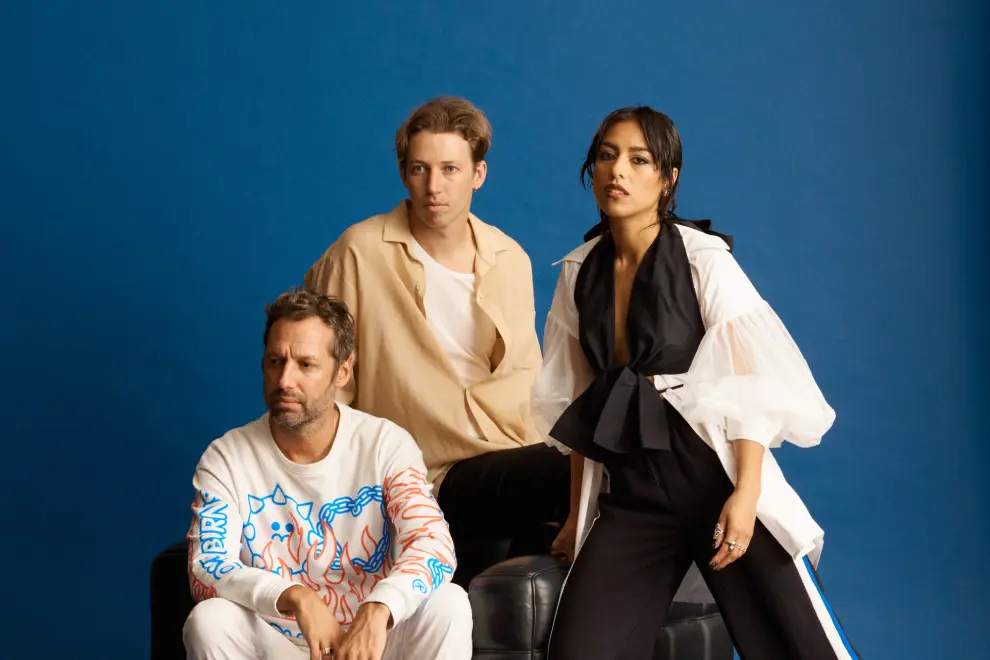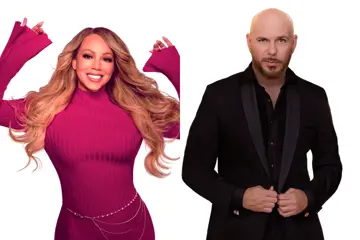While singing Fame in a school musical, Telenova’s singer Angeline Armstrong had an epiphany: “I’m a performer!” And ever since she was “thrown in a room together” with Joshua Moriarty and Edward Quinn – all strangers, then – at a songwriting camp, doors keep opening for these musical soulmates.
According to Angeline Armstrong, Telenova’s debut album, Time Is A Flower, chronicles “the human experience within this capsule of time that’s quite strange to navigate”.
“Time is this mysterious thing that we exist in,” the lead vocalist, songwriter and filmmaker expands. “But it seems like we’re always longing for something that's gonna last forever instead of something that just has a beginning and a middle and an end. And our past experiences and emotions seem to inform and intrude the present more than what makes sense, considering we see everything linearly – or think that that’s the way everything’s happening.”
When told that Margot is this scribe’s fave Time Is A Flower cut at present, Armstrong extols, “That's my favourite at the moment, too! We've just been playing it to all these super-young crowds ‘cause we did a girl in red support tour, and that was the song that really went off with 18-year-old girls [laughs].”
“Shoulda known better than to think I could forget her/ Heaven could’ve sent her, did I have it all wrong?” – we can imagine audience members picking up Margot’s catchy, staccato chorus lyrics – repeated frequently throughout this bittersweet belter – from first listen to sing back at her.
“I did notice that every time that bit came back, there was a recognition,” Armstrong allows. “People would start clapping along and dancing, and there was a powerful energy in the room.”
We also can’t help but wonder whether anyone in Armstrong’s inner circle might recognise themselves in Margot – You’re So Vain-style.
“Well, no,” the singer enlightens, “‘cause Margot's kinda like the name that I give to all the women that you watch from afar and get really envious or jealous of and think that they're the perfect version of everything you wanna be in a woman. And then you realise at the end of the day that they're all as insecure as you are and just trying to figure it out.”
Bongos leap from the mix during another highlight track: Tremors, Traces. “Yeah, they're very alive,” Armstrong concurs, “‘cause a lot of the drums that we use are really leaning into that ‘90s trip-hop genre, you know, like hip-hop drums and sampled drums that are looped. When we're in the studio, we're not actually recording with a live drummer. But we do bring in a percussion guy to add some little extra bits and pieces, like bongos and tambourine – that real organic, percussive element on top of the more electronic, sample-y sound.
“Working with Josh [Moriarty, multi-instrumentalist/producer] and Ed [Quinn, multi-instrumentalist/producer], I’ve really come to appreciate a more sample-y approach to making music because they really bring that into their production.
“Sometimes, it’s sampling our own music – a section of a demo or a piano part or something – and then we just speed it up, resample it and try to make a new song out of it. Because there is something really beautiful about taking something that existed at a different time and then placing it somewhere it doesn’t belong. There’s something magic that seems to happen, like this in-between space; it feels nostalgic but also fresh, new and of the future.
“I think we can all go further, and as each album progresses, I hope that we get wackier and bolder with the creative ideas that we’re offering. Because, yeah! I mean, it’s been such an interesting journey for us. Because when we met, we were strangers. So you’re kind of getting to know each other – and the dynamic in the room – at the same time as being quite vulnerable creatively. So it’s been interesting for that to be happening in tandem with actually creating music together.
“‘Cause Josh and I work on a lot of the lyrics together, I felt that there’s been a lot of times where we were talking to each other through lyric-writing instead of – we weren’t saying to each other, face to face, like, ‘I’m feeling this right now,’ or, ‘I’m feeling this tension of being torn in two,’ but the lyrics we’re both writing are obviously about that, and there’s some sort of underlying communication that’s going on. But I guess we felt more comfortable as strangers talking to each other through the lyrics instead of saying it out loud.”
So when did Armstrong realise she’d been blessed with a magnificent singing voice? “Mum said I could sing before I could talk; she said I'd walk around the house singing songs about what I was doing. So Mum would say, since I was young, she knew I had a beautiful voice.
“But for me, personally, it was probably when I was 12. I auditioned for the school musical, and that was the first time that I'd had external validation, I guess, where someone went, ‘Yep, you've got a really good voice. You get the microphone, and you get to sing a solo part in a musical.’ So that was probably the moment where I went, ‘Oh, I'm a singer!’” she admits with a chuckle.
“I went to a public school where we couldn't ever afford to hire proper musical scripts, so we'd write our own musicals and then insert covers and replace lyrics from famous songs. But my song was from Fame: The Musical, which is pretty awesome. It was like, ‘I'm gonna live forever/ I'm gonna learn how to fly…’ – the [Fame] lyrics are so apt. It's such a beautiful ‘first time onstage in the spotlight’ moment… Understanding that, ‘Oh, I'm a singer. I'm a performer’ – to that song.”
Telenova formed in 2019 at an APRA SongHubs songwriting camp held at the Box Hill Institute (“they've got these really fancy studios”). “We met in a music studio, and now we spend most of our time hanging out in a music studio, so it just feels like we were born there,” Armstrong observes.
Having “officially walked out of” her previous musical project, Beachwood (an electro duo, rounded out by Jarrad Rogers), Armstrong arrived at the camp “feeling quite disillusioned”.
“I'd had a proper chance – professionally – in the industry, but it wasn't working out,” she reflects. “I had a lot of bad experiences in that [previous] year and thought, ‘Okay, being a professional musician is obviously just awful, so I wanna go back to when it was just me playing in my room or, you know, playing a pub show once a month or something.’
“So I was in the midst of that mess when I found out that I'd gotten into this SongHubs camp, which was curated by Chris Walla from Death Cab For Cutie and, yeah! It was actually based off a bunch of demos that I had done independently; it wasn't actually anything to do with the music that I had the record deal on. So, for me, that was very encouraging because it was very affirming that someone recognised the artistry and talent from the days when I was just in my bedroom playing to myself.
“I was coming from a place of feeling so low, but being at this camp was so inspiring, ‘cause it was so well-curated and everyone there had their own distinct voice. They were very sensitive and encouraging. It was a really beautiful, nurturing environment. And so every day of that camp I felt rejuvenated and renewed by working – collaborating with other musicians, which I hadn't had a huge opportunity to do.
“It's quite strange because the boys in Telenova – though we didn't know at the time – were also coming from projects that were either slowing down or wrapping up [Moriarty and Quinn had previously released music in Miami Horror and Slum Sociable, respectively] and so we were kind of like the lost children,” Armstrong shares, laughing. “We found each other at a time where we all really had a need to create and express something, and helped each other do that better than we would have done on our own.”
Each future Telenova member had musical pedigree and a taste of success, but they hadn’t yet found their musical soulmates. Then, on day four of this elite songwriting camp, Armstrong was “thrown in a room together” with two “random people” and viola!
“We'd never met before, and from the first hour of working together, we were all so excited by what each other was bringing to the table,” Armstrong gushes. “We all felt equal ownership, and we liked the song we were making [the title track from their debut EP, 2021’s Tranquilize], which isn't always the case when you're collaborating with strangers. After that first day, there was something magic about our creative chemistry.
“So when the camp finished, we kept meeting up together and then eventually had enough songs to record an EP and got offered a gig at a local festival… came up with a band name and then management came along to the show and signed us! Then, from there, the doors kept opening.
“If that songwriting camp hadn't happened then – at that time – I think it's really likely that I'd be really angry and disheartened with the music industry to this day, and probably doing film or something and enjoying that [instead]. But I'm so glad that camp happened when it did.”
Armstrong also has a background in film and has directed many stunning music videos for both Beachwood and Telenova. “‘Cause I creative direct, I also love the music videos and coming up with the concepts for the photo shoots and all that stuff as well,” she enthuses of her role within Telenova.
If watching non-dancers trying to hold their own alongside professional dancers gives you the ick – we’re looking at you, Avril Lavigne, in the Girlfriend clip (Armstrong: “I do know the one you're talking about. That’s a prime example”) – you’ll be pleased to know that Telenova’s choreographer of choice, Zoee Marsh, works to Armstrong’s strengths (see: the film clip for Discothèque Inside My Head, Telenova’s latest single release).
“First and foremost, I'm not a dancer; I can dance, but I'm not trying to show off my crazy dance skills,” Armstrong points out. “I'm just a person who loves to dance, so I think a lot of the choreography that I work on with Zoee is more like an extension of my own natural movements and the way I gesticulate and express myself physically – what hand gestures I might actually use if I was expressing the lyrics to someone with a lot of emotion – and then kind of playing with that in a quirky way. As opposed to, like, ‘Here's this really complex dance segment, and I'm gonna teach it to you, and you're gonna do it. Do a pirouette and a stag jump and…’” Armstrong trails off, laughing.
“We'll workshop stuff in the studio together. It's really about having a space to play, where I feel safe and I'm with someone who really knows what they're doing. And she'll just be like, ‘Try this. What happens if you throw your hands around more?’ It's a lot more playful and interpretive, I suppose, and I leave with inspiration and little prompts to remember if I'm feeling a bit stuck on stage: you know, if this song feels like a feather floating, then how does that feather move? It's very conceptual as opposed to choreographed.”
So, did Armstrong get to keep the cool mirrorball helmets featured in the band’s latest music video? She chuckles before revealing, “Well, I mean, on a film set, you're so tight afterwards – from the budget – that you try and resell everything. So, I think the production designer actually resold them as pot planters, which is great! I hate when props and stuff end up in the bin. So we wanted to repurpose them, and someone bought them – I don't know if they're a fan of Telenova, but they're definitely a fan of disco balls.”
Lush, quivering string arrangements are just one of Time Is A Flower’s swoony sonic motifs. The trio was initially introduced to their string arranger of choice, Tamil Rogeon when they were “paired up with this random group of people” – also including Mindy Meng Wang (“she plays a Guzheng”) – to perform a cover of Hiatus Kaiyote’s Red Room at 2022’s APRA Music Awards.
On working with Rogeon for the first time on this album, Armstrong marvels, “We just gave him the songs and then, a few weeks later, he had some versions of string section parts on this beautiful, big, handwritten sheet music. We spent half a day recording all those parts – with probably 20 to 30 string players – and it just gives [the record] such a lift. We love the orchestral feel – yeah, really wanted that.”
After the songs were selected for Time Is A Flower – aside from its one-minute opener, The Wallpaper – Armstrong “recognised these recurring themes that Josh and I kept writing about”. As such, she felt compelled to compose this contemplative, strings-enhanced “prelude”, “...to go, ‘This encapsulates what all these other songs seem to be circling.’
“A lot of the music, the themes and songs on this album – there’s a lot of duality and push-and-pull in the lyrics, and tension of light and dark: longing for something beautiful, but being stuck in ugliness. Or tension between past and present and, yeah! I think all of that came out of us having very different experiences of life at times or struggling with different things and butting against each other.
“We’re trying to write a song at the same time, but we’re coming from different places. And instead of fighting that and going, ‘No, here’s the frame: we’re writing a song about grief, so put it in there,’ I enjoyed letting us be free in what we needed to express. A lot of the songs feel like conversations to me.”
Time Is A Flower will be released on 16 August through EMI - pre-order the album here. Telenova are currently on tour.
TELENOVA
TIME IS A FLOWER AUSTRALIAN TOUR
Friday 16 August - HABA, Rye VIC
Saturday 17 August - Volta, Ballarat VIC
Thursday 22 August - Mo’s Desert Clubhouse, Gold Coast QLD
Friday 23 August - The Northern, Byron Bay NSW
Saturday 24 August - Kings Beach Tavern, Kings Beach QLD
Sunday 25 August - Tanks Arts Centre, Cairns QLD
Friday 30 August - Bridge Hotel, Castlemaine VIC
Saturday 31 August - Torquay Hotel, Torquay VIC
Tickets here.






